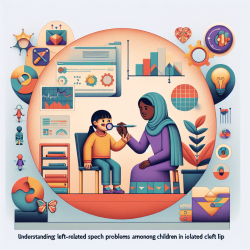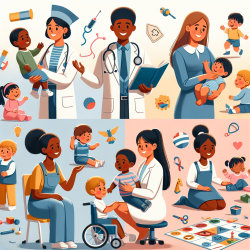Introduction
The study "Incidence of cleft-related speech problems in children with an isolated cleft lip" provides critical insights into the speech and language challenges faced by children with isolated cleft lip. As speech-language pathologists, understanding these challenges can significantly enhance our ability to create effective, evidence-based interventions.
Key Findings
The study conducted a prospective analysis of 75 children with isolated cleft lip, revealing that 24% required speech and language therapy. Interestingly, only 1.3% of these children had cleft-related speech problems, suggesting that isolated cleft lip does not inherently increase the risk of such issues. However, 21% of the children experienced episodes of acute otitis media (AOM) or otitis media with effusion (OME), indicating a potential area for further monitoring.
Implications for Practice
These findings have several implications for speech-language pathologists:
- Early Assessment: Regular speech assessments can help identify non-cleft-related speech problems early, allowing for timely intervention.
- Multidisciplinary Approach: Collaborating with otolaryngologists and other specialists can help address ear-related issues that may affect speech development.
- Parental Involvement: Educating parents about the potential for speech and ear problems can empower them to seek early intervention.
Encouraging Further Research
While the study provides valuable insights, it also highlights the need for further research. Understanding the nuances of speech development in children with isolated cleft lip can lead to more targeted and effective therapies. Speech-language pathologists are encouraged to engage in or support research efforts to expand the knowledge base in this area.
Conclusion
The study underscores the importance of data-driven approaches in speech-language pathology. By leveraging research findings, practitioners can enhance therapeutic outcomes for children with isolated cleft lip. For a deeper understanding, practitioners are encouraged to review the original research paper.
To read the original research paper, please follow this link: Incidence of cleft-related speech problems in children with an isolated cleft lip.










